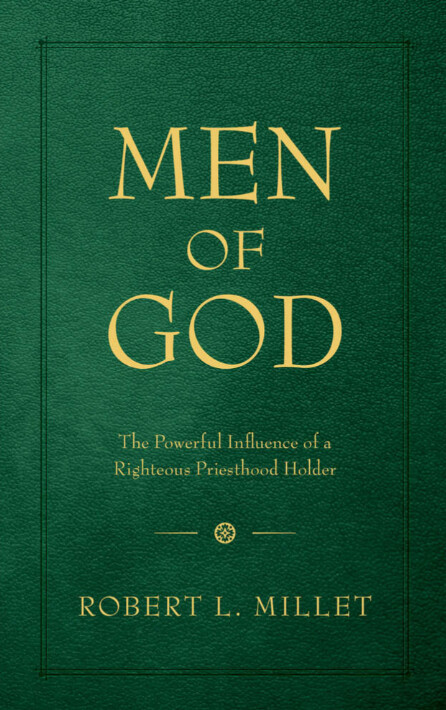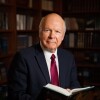There is nothing wrong with aspiring to greatness, aspiring to spirituality, aspiring to be the best we can be. There is surely no sin in seeking to be better, sharper, more proficient, more intelligent, more effective. In fact, we really ought to work smarter in the Church and kingdom of God than we do. And, secondly, there is nothing wrong with receiving the honors of the world. Many of our great Church leaders of the past have been acknowledged nationally and internationally for their gifts, talents, and contributions. …
We are warned not simply against ambition but against vain ambition. Something is vain when it is empty, shallow, eternally meaningless. We have been called to labor. We have been selected to make choices, to set priorities, to see to it that we value some things more than others. “Lay not up for yourselves treasures upon earth,” Jesus counseled, “where moth and rust doth corrupt, and where thieves break through and steal: but lay up for yourselves treasures in heaven, where neither moth nor rust doth corrupt, and where thieves do not break through nor steal. For where your treasure is, there will your heart be also” (Matthew 6:19–21; emphasis added). There are men throughout the world who labor long hours in making a living. Some spend the greater part of the day adding to their pile of surplus, expanding upon the affluence they have already attained. Others build houses that approximate castles, residences that almost resemble cathedrals.
Forgive my boldness, but is this really necessary? When is enough enough? To be sure, we are called to labor, but the Lord’s commission to each of us is “Come, my brethren, every one that thirsteth, come ye to the waters; and he that hath no money, come buy and eat; yea, come buy wine and milk without money and without price.” Now note this pressing passage: “Wherefore, do not spend money for that which is of no worth, nor your labor for that which cannot satisfy” (2 Nephi 9:50–51; compare Isaiah 55:1–2). Every family, to the extent that it can do so, likes to enjoy the little comforts, luxuries, and niceties that make life pleasurable, but we must, at the same time, take seriously the words of our Lord: “Take heed, and beware of covetousness: for a man’s life consisteth not in the abundance of the things which he possesseth” (Luke 12:15). In other words, the cute and coy cry that “he who dies with the most toys wins” is not really true, especially in regard to eternal matters. As Elder Lance B. Wickman of the Seventy taught: “This life is not so much a time for getting and accumulating as it is a time for giving and becoming.”1
This life is not so much a time for getting and accumulating as it is a time for giving and becoming.
It is tragic to witness men who would never consider embezzling funds from their place of work be less than faithful in their priesthood responsibilities; those who would not think twice about whether they should smoke or drink yield to the persuasions of pleasurable living and spend most of their time in the lap of luxury; and those who are in constant search for some new toy, some new investment, some new avenue to even greater prosperity, whose search of the scriptures and the sermons of living apostles and prophets is limited to what is discussed in Church on the Sabbath.
I say all of this to remind each one of us why we came to earth in the first place, how desperately our wives and children and friends and neighbors need our righteous influence, and where peace and contentment are ultimately to be found. “We have been entrusted to bear the priesthood and to act in the name of God,” President Thomas S. Monson testified. “We are the recipients of a sacred trust. Much is expected of us. We who hold the priesthood of God and honor it are among those who have been reserved for this special period in history.”2
Notice what the Master stated in regard to William W. Phelps in 1831: “And also let my servant William W. Phelps stand in the office to which I have appointed him, and receive his inheritance in the land [Missouri]; and also he hath need to repent, for I, the Lord, am not well pleased with him, for he seeketh to excel, and he is not sufficiently meek before me” (Doctrine and Covenants 58:40–41; emphasis added). What an odd expression. Shouldn’t we seek to excel? Shouldn’t those called to labor, the men of the priesthood, excel? Doesn’t the Father expect us to live an excellent life, to pattern ours after His Most Excellent Son? Certainly we should do the work of the Lord excellently. We should have an excellent record of priesthood ministering, meeting regularly with our assigned families, strengthening our bonds of friendship, and nurturing them by the good word of God (see Moroni 6:4). Certainly we should seek to hold excellent, as opposed to shoddy, family prayers, family scripture readings, and family home evenings. Certainly we should be excellent in our attendance at church meetings—a regular, active, practicing, and involved member of the body of Christ. And so forth.
▶ You may also like: If we are keeping the commandments, should we be wealthy? The faults in that line of thinking
What we do not want to do, however—as William W. Phelps was chastened for doing—is to “seek to excel,” that is, to do things to be considered excellent, to gain the applause and reputation of fickle observers. “It is natural to assume,” Elder Bruce C. Hafen observed, “that when we don’t appear to be doing ‘excellently’ the perfection process is not working. But the exact opposite may be true. Our moments of greatest stress and difficulty are often the times when the refiner’s fire is doing its most purifying work. …
“I am addressing primarily a need for perspective,” Elder Hafen continued. “I do not mean to diminish the value of serious commitments to personal achievement and responsibility. … But the striving must be to find out God and to accept fully the experiences he knows will enlarge our souls. The trouble with modern pursuits of excellence is that they can become a striving to please other people, or at least to impress them or to seek their approval. A desire for such approval is not all bad, especially among Church members, who generally reserve their approval for accomplishments having positive value. But other people are not finally our judge, and making too much of either the affirmative or the adverse judgments of others can actually undermine our relationship with God and our development of sound values.”3 President Joseph F. Smith has even suggested that three of the great dangers that “threaten the Church within” are false educational ideas, sexual impurity, and the flattery of prominent men in the world.4
It was our Lord and Redeemer who taught a deeply profound lesson in few words: “I receive not honour from men” (John 5:41). Jesus was sent to earth to restore the gospel in its fullness, to teach the principles of salvation, to confer priesthoods and keys, and to offer immortality and eternal life to as many as would receive them. He wanted desperately for His gospel message to be accepted and adopted, for people to come unto Him and find rest to their souls (Matthew 11:28–30). But He did not court favor. He was no respecter of persons (Acts 10:34). With all the light and knowledge and power at His disposal, He did not do things to make a good impression; He did not manage appearances so that the Jews or the Gentiles would be wowed by His presence or His precepts. He was the Way, and He pointed the way. He was the Truth, and He taught the truth. He was the Life, and He offered the abundant life (John 14:6; 10:10). He “went about doing good” (Acts 10:38), but He did not put on airs. He served His fellow beings on earth, but He did so without fanfare. He lived a life in which He was constantly inconvenienced, but He never boasted of it. He was who He was, and He thereby stands as our Model, our Prototype. His ambition was sublime, the grandest and most profound of all ambitions—namely, to save every living soul.
Men of God
This book explores specific principles and how they relate to the men in the Church, including prayer, faith, marriage, and the oath and covenant of the priesthood. Drawing on scripture, the words of the prophets, and personal experience, Millet offers guidance on how men can better act on their desires to be loving husbands and father, generous friends and neighbors, and dependable representatives our Savior—in other words, to be men of God.
Notes
1. Lance B. Wickman, “Today,” Ensign, May 2008.
2. Thomas S. Monson, “Royal Priesthood,” Ensign, Nov. 2007.
3. Bruce C. Hafen, Broken Heart, 97–99; emphasis added.
4. Joseph F. Smith, Gospel Doctrine, 313.



